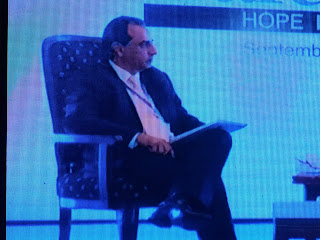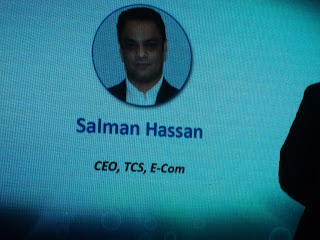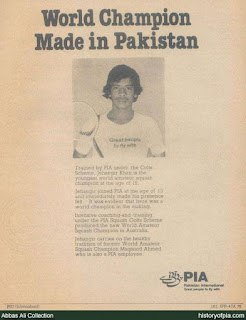MERRY MEADOWS - Chapter 15 - Dreaming + Daring = Entrepreneurship
Memon Professional Forum’s 5th
Entrepreneurship Conference 2015 advocates Hope + Risk + Belief as recipe for
success
Celebrating three decades of a
very vibrant existence, the Memon Professional Forum (MPF) brought together an
impressive array of leading lights from the worlds of trade, commerce and
industry to dwell upon the phenomenon that is entrepreneurship, in its search
for peace, progress and prosperity for Pakistan.
The heavyweights on board
comprised M. Ali Tabba (CEO, Lucky Cement Limited), Arif Habib (CEO, Arif Habib
Corporation), and Khalid Awan (Founder & Chairman TCS Holdings Private
Limited), with Moin M. Fudda (Country Director, Center for International
Private Enterprise) and Rafiq Rangoonwala (COO, Burger King Pakistan) providing
the stimulus for thought provoking discussions. The Conference celebrated Dr.
Abdul Bari Khan and his social enterprise the Indus Hospital built on ‘Pukhta
Yaqeen’ (firm belief).
Conference proceedings began with
the convener of the conference, Muhammad Hanif Jakhura (CEO, CDC Pakistan
Limited) and president MPF Abdul Aziz Tayabani (CEO, Noorani & Company)
welcoming the guests and providing a brief on the MPF.
“Memons great example of
industriousness, risk taking and philanthropy” – Khalid Awan
The TCS chairman Khalid Awan delivered
the keynote address. He termed his presence at the conference as a truly
inspiring and humbling experience. “The most important pillars of the nation
are those who create wealth, and the Memon Community is a leading such pillar,
a great example of industriousness, risk taking and philanthropy,” he said.
Terming himself a first generation businessman, Khalid Awan said that it was in
the sharing of our stories that we enrich ourselves, with the real magic not in
the profits but in the people who make success possible. “It is the possibility
of a single dream coming true that makes life worthwhile.”
Team TCS engages Octara in a stimulating exchange (Left-to-Right) Asma Shaikh, M.A.Mannan, Qasim Awan, and Jamil Janjua.
Mr. Awan’s advice was to shape a
culture of enterprise and integrity and everything else will follow. “Describe
your vision and people will share it.” He sounded a note of warning, however.
“There will always be skeptics. First people will ignore you; if you persist
they will ridicule you; you keep at it and then they will fight with you. That’s
when you know you have arrived.”
He described the TCS journey as highly
charged with emotion, during the course of which no special favours were
received. “It is never a popularity contest, and it entails the taking of hard
decisions. It has been an exciting journey during the course of which an
enterprise has been created that runs through the bloodstream of the nation.
Every day half a million shipments are generated.”
“We have succeeded in reinventing
ourselves”
With the arrival of the Internet many
TCS people felt threatened, said Mr. Awan. “We have succeeded in reinventing
ourselves, however. Behind the scenes TCS teams have developed new products and
services. We saw opportunities in outsourcing, a dynamic new trend in the
emerging global village, and we set up state-of-the-art printing facilities in
two locations for the printing and in-time distribution of utility bills and
bank statements. Here we have electronic interface with the client’s database,
saving the client major expense and hassle. We set up an inventory management
system for sim cards, with the telecom companies’ cash flows major
beneficiaries. We have introduced the TCS Supply Chain Advisory to streamline
and optimize our customers’ operations. We firmly believe that in our customers’
growth lies our own growth.”
Khalid Awan describes e-commerce as
the most exciting evolving frontier that has vastly enhanced outreach.
Complimenting it is the new TCS product ‘Hazir’, the 60 minutes pick-up promise
that he says is a big challenge, but one which robust technology is making
possible. Winding up his keynote address Mr. Awan paid special emphasis on
organizational development, and was particularly proud of the fact that over
850 MBA graduates from our leading business schools had applied to TCS for
employment.
“Given proper management Pakistan can
become a welfare state for its people” – Arif Habib
Next up was the address by the chief
guest Arif Habib, better known for his six stints as president/chairman of the
Karachi Stock Exchange. Lesser known is the fact that he is a leading light of
the fertilizer industry as chairman of Fatima Fertilizer Company Limited,
Pakarab Fertilizers Limited, and DH Fertilizers Limited in addition to being
chairman of Aisha Steel Mills Limited and Arif Habib DMCC Dubai, alongside his
primary function as chief executive of the Arif Habib Corporation Limited, the
holding company of the Arif Habib Group.
Arif Habib was firmly of the view that
an increase in economic activity was the only route to defusing the ticking
human population bomb and ensuring that Pakistan’s demographic dividend doesn’t
turn into a liability. “We need to encourage a stronger partnership between
professionals and entrepreneurs. Allah has blessed us with so much but we are
not managing well these blessings. Pakistan has huge potential, and given
proper management it can become a welfare state for its people. We need to
address the problems of security, corruption and low technology, and focus on
the low hanging fruit in the agriculture, construction and information
technology sectors. Labour intensive industries will resolve the employment
issues.”
With the oil prices coming down Mr.
Habib felt it was time to launch infrastructure projects, but he lamented the prevalence
of the extremely low trust culture within which decision makers were fearful of
taking big decisions for fear of accountability. He gave a wide ranging
snapshot of the economic landscape and the many opportunities within it, and
cited the shortage of infrastructure as the main hindrance deterring private
investment.
Funding your dream
Following the first tea and coffee
break of the day, Jawwad Farid of Risk Solutions took the stage on the issue of
funding your dreams. In the midst of all the very valid advice that he
proffered, the one which stood out was incubating your project with your own
shoestring resources until it achieves critical mass and starts attracting the
attention of the marketplace.
“If the message that you send out is
that you need the money, then you will have problems getting funding. The more
desperate you are the greater the difficulty. If the system doesn’t work for
you then learn to operate outside of it. For every why you encounter ask why
not? Show the world what you see and give them a reason to believe, but don’t
hold your breath. The best source of funding could take time to materialize.” Valid
advice.
Founders’ Pitch
The next event on the menu was the
granddaddy of the day that gave practical expression to the conference title,
entrepreneurship. Moderated by Octara associate Hassan Bin Rizwan (Prymus
Technology), eight startups were given three minutes each to make their
elevator pitch (so called because that’s how long you have in an elevator to
buttonhole a financier) to a panel of judges who would decide a winner and
handover a cheque of one hundred thousand rupees to aid project mobilization. The
panel of judges comprised Moin Fudda (CIPE), Jawwad Farid (Risk Solutions), and
Imran Moinuddin (DotZero & Next Degree).
No surprises that 7 of the 8 projects
presented were Internet based, catered to the moneyed classes, and were half
baked for the most part, except perhaps the one put forward by SmartChoice,
shopping made easy, which lost out by one point. The one that got the judges
attention and vote dealt in bricks and mortar, as it were, and addressed the
concern of the grassroots – a high-tech, scientifically designed vending cart
that offered space optimization and would result in street vendors occupying
less space on the city pavements and roads, along with adding a pleasing
aesthetics dimension to our public spaces. The AeroSync team of young
entrepreneurs comprised of students of the Karachi University’s visual arts
department, and was over the moon with their success.
The Founders’ Pitch had brought to the
fore a healthy indicator. A segment of the youth were using their brains in new
path finding ways in their search for self-employment, and thinking like
employers rather than employees, and not looking for ‘secure’ employment shelters.
The million dollar question concerns the extent of this segment of potentially
trailblazing youth? Were these youngsters flashes in the pan? Or were they the
front-end of a new and vibrant trend on the national landscape? Given the sad state
of Pakistan’s enabling environment for new startups, and the national
preoccupation with government employment, what we had here was more than likely
a one off phenomenon.
Entrepreneurial behavior
Muhammad Ali Saeed, the CEO of SAOO
Capital, was up next providing insights into leading behaviors for
entrepreneurs. He started proceedings with putting up the celebrated Apple
recruitment advertisement that dated back to
1997 and epitomized the DNA of entrepreneurs. Created by the Los Angeles office of advertising agency
TBWA/Chiat/Day, the copy read “Here’s to
the crazy ones. The misfits. The rebels. The troublemakers. The round pegs in
the square holes. The ones who see things differently. They’re not fond of
rules. And they have no respect for the status quo. You can quote them,
disagree with them, glorify or vilify them. About the only thing you can’t do
is ignore them. Because they change things. They push the human race forward.
And while some may see them as the crazy ones, we see genius. Because the
people who are crazy enough to think they can change the world, are the ones
who do.”
So now we know what
it takes to be an entrepreneur. The other insight that Muhammad
Ali Saeed offered and which stood out from the many others, concerned the story
told to him by a grizzled old billionaire sharing space with him on an air
trip. It was the enduring story of the hare and the tortoise that every
generation has heard. When Muhammad Ali Saeed asked the billionaire the secret
of his business success, all he said in reply was that “the tortoise always
wins!” that appeared as a self-evident truth. The tortoise does always win no
matter how many times the story is told. “But we all want to be the hare!” the
billionaire had exclaimed. “We are all drawn to the flash and the dash, whereas
it’s always the slow and the steady who win the race!” Sound advice.
“Success entails responsibility to pay
back to society” – Muhammad Ali Tabba
Entrepreneurial behavior was the last
session before lunch, and after a generous spread had been partaken of the
conference reconvened, and the session in store was a powerful one, powerful
enough to keep people wide awake, heavy lunch and full stomachs
notwithstanding. Having Qahwa with the interviewer Rafiq Rangoonwala was the
interviewee Muhammad Ali Tabba, the CEO of Lucky Cement as well as Yunus
Textile Mills, and vice chairman of ICI Pakistan.
Mr. Tabba was described by Rafiq
Rangoonwala as a man who had stayed humble despite the great success he had
enjoyed in life. It was a highly illuminating exchange, and Muhammad Ali Tabba
took the gloves off in his appraisal of the national scene, saying that if
there was a choice to change something in the past he would choose to change
the politicians. He said there were lots of opportunities to be taken advantage
of, and there was an urgent need to move away from basic industries, and invest
in new ideas and technology, and further expand the service industry.
Integrity has become a big challenge
in Pakistan he said, and the bane of corruption was causing meritorious
professionals to find opportunity outside the country. Passion and integrity
are what Mr. Tabba looks for when hiring people, and says that he would not be
unduly concerned if his children chose not to join the family business.
Striking a work/family balance is not easy, he admits, and takes vacations with
his family to beach resorts to unwind. He lives a simple life as per the
training of his father and grandfather, and cites his father as the main
inspiration in his life.
Working out in the gym every day is
how Muhammad Ali Tabba manages stress, and believes that staying fit is central
to staying productive. Success entails responsibility to pay back to society he
says, and in him society has found a generous philanthropist with extensive
engagements in many community welfare projects in the fields of education,
health and housing. In his view it’s good to be a workaholic, and when one’s
dreams have been achieved he feels one simply raises the bar and dreams some
more.
“Indus Hospital’s success is based on
‘Pukhta Yaqeen’” – Dr. Abdul Bari Khan
Dr. Bari is a phenomenon in the field
of social entrepreneurship, and was celebrated by the Memon Professional Forum
by being invited to speak on ‘community development through innovation.’ Dr.
Bari’s brainchild is the Indus Hospital, a premium health care facility for
people who do not have the means to pay for quality medical care. Managed by a
competent team under his dynamic leadership, the Indus Hospital has treated
more than 2.3 million patients since its inception in 2007, and is scaling up
rapidly with 900 beds becoming operational by December 2015.
The Indus Hospital’s success Dr. Bari
attributes to the good intentions of all concerned and their firm belief in
Allah’s bounty. It is that which has made possible this vibrant enterprise which
is now replicating in smaller towns across Pakistan as well as overseas. His
major concern is for the very bad state of health care in the rural areas where
doctors refuse to go, and he and his team are in search of innovative solutions
to plug the gap. Passion is infectious, he says, and one must walk one’s talk,
and pays special tribute to Dr. Saba Jamal whom he says has worked wonders with
the blood center at the Indus Hospital.
Incentivizing Compassion
Next on the agenda was a panel
discussion titled ‘Incentivizing Compassion – How to build sustainable social
business’. Moderated by Moin Fudda, the participants included Naeem Zamindar
(Country Director, Acumen Fund Pakistan), Dr. Abdul Bari Khan (CEO, Indus
Hospital), Dr. Asif Imam (Chairman SINA), and Shabbir Bilwani (Director, Agile
Offices). These were all good Samaritans who were working against daunting odds
in the service of the less served and less privileged.
It’s poor political leadership and bad
governance notwithstanding, Pakistan has been generously endowed by a large
hearted class of wealthy people who have made Pakistan amongst the world’s
leading philanthropic nations. The fact that Pakistanis are also amongst the
world’s leading tax evaders merely points to a huge trust deficit between the
state and its people born of poor political leadership and bad governance. This
in turn has led to the phenomenon of the private-public partnership which many
see as the state abdicating its responsibility to the people and surrendering
space to private initiative.
It was a wide ranging discussion that
advocated competence, character, integrity, respect, the ability to listen, and
a suppression of the ego. Transforming madressahs into centers of modern
learning along with religious instruction bore special emphasis, and Sattar
Edhi was given a standing ovation for his services to the nation and his
inclusion in the Guinness world records book for the largest ambulance network
in the world.
Capitalizing on rising trends
Mohammed Sohail is the CEO of Topline
Securities, and ‘Seizing the Opportunity: Capitalizing on Rising Trends in
Pakistan’ was the subject of his discourse. Between Dr. Bari of Indus Hospital
and the Incentivizing Compassion panel discussion, which had taken up much more
than their allotted time, Sohail’s 1605 to 1625 time slot had long gone, with the
natives getting restless for the tea and coffee break! But the first slide that
he put up had everybody’s attention.
If you Google ‘rising trends in
Pakistan’ the top three results obtained are rising poverty trend, rising
trends of terrorism, and rising trend of violence. The situation is
deteriorating for risk takers and entrepreneurs in Pakistan, was Sohail’s view.
He also felt that by and large Pakistanis were not competent, nor hardworking,
and they were averse to taking risks. Fortunately for us there is plenty of
hard evidence to the contrary, and Google’s findings are based on a biased and
sensation seeking media that bothers not to explore below the surface the rich
and vibrant mosaic of a hospitable and industrious nation.
To his credit Sohail did admit that
Pakistan has a lot of opportunities for creating value and taking calculated
risks because of the very big, unexplored, and inefficient market characterized
by low productivity and low penetration. The Pakistani consumer story remained
intact, he said, due to favorable demographic trends, a growing middle class,
rising urbanization, and increasing health awareness. In information technology
there were a lot of opportunities for people with creative ideas.
New Media and business growth
The second tea and coffee break of the
day was finally arrived at, and with it began the last item on the agenda for
the day, a panel discussion on digital marketing and leveraging the new media
for business growth, moderated by Hassan Bin Rizwan (Prymus Technology). The
panelists represented the new age corporate warriors with cyberspace as their
battleground. There were Faisal Sheikh (GM & Head Digital, Brainchild
Pakistan), Salman Hassan (CEO, TCS E-Com), Osama Qassim (CEO, QnE), and Amin
Rammal (Director, The Brand Crew).
The issues at stake were important. Is
digital better than traditional platforms for new startups? What do the digital media offer to startups to
get the word out? How do we go beyond the ‘Likes’ and create traction? How do
we create engagement without running contests and sweepstakes? What are the
ideas for content strategy? How can startups leverage the power of memes to
gain reach and engagement?
Salman Hassan must have felt a little
like Gulliver in the land of the Lilliputians given the giant stature of the
TCS brand, and the expectations thereof from TCS E-Com which has hit the ground
running with the new TCS product HAZIR as its running-mate. Like in every other
sphere of business endeavour in Pakistan, there is great potential in e-commerce.
That is what has been historically said about Pakistan, that it has great
potential. Translating that potential into actual fact has been another matter
altogether, and we have given practical expression, time and again, to the old
English saying ‘there is many a slip between the cup and the lip.’ There is a felt
need to flip that slip and plug the performance gaps that have bedeviled the
attainment of progress and prosperity in Pakistan.
Both tiring & exhilarating day!
With that we came to the end of
proceedings in the midst of much memento presentation and networking. It had
been a tiring day, but that wouldn’t hit home until much later. Right now the
brain was buzzing and the senses were heightened. The Memon Professional Forum
had sounded the bugle amidst a call to battle stations. Entrepreneurship was
the battleground where the war would be won, and not just against terrorism.
Entrepreneurship and the spirit of self-employment would cultivate the mindset
of employers within the population of Pakistan, banishing forever from our
midst the disgrace of unemployment, Allah be praised.







































Comments
Post a Comment